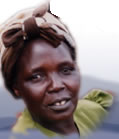THEMES IN THIS
TESTIMONY
Family Life

Gender

Health

Social Relationships

Click on arrows
to find more
testimonies
featuring
these themes
|
|
Sex
|
Female
|
|
|
Age
|
30
|
|
|
Identity
|
Sabaot
|
|
|
Occupation
|
Farmer/petty trader
|
|
|
Location
|
Kapsokwony market
|
|
|
Date
|
18 November 1996
|
|
summary
This interview revolves mainly around the moving account of the narrator’s married life. The main issues are a wife’s role, domestic violence, and family planning, and the text offers a revealing and sobering account of attitudes towards these. It is interesting to compare the view of a married woman’s position put forward in this interview with those of some of the other female narrators in this collection. The contrast brings to light the fact that whilst some may think that women’s social position has improved, for others it doesn’t seem to have changed much. This may be influenced by social class and family wealth.
detailed breakdown
|
You will need a password from Panos to view the full
transcript of the interview. To apply for a password, click here.
Once you have a password, click here to go to the beginning
of the transcript. You can also click on any section of the
breakdown of content below and go straight to the
corresponding part of the transcript.
|
| Section 1-3 |
Family background – the narrator talks about her children. Believes that people value a boy more because “he is the one who will build the foundation of the home”. Negative attitudes towards girls’ education: some believe girls lack “educatability”.
Describes how with the old customs parents would receive support in child rearing, whereas nowadays “each person says, ‘me and my family alone’”.
|
| Section 3-4 |
Says that she was forced to move out of her old home to vacate it for her husband’s second wife who had produced boys, whereas she produced girls and had had two of her children die. Feels hurt at the “discrimination” against herself and her children, but adds, “there is nothing I can do because I am a woman”. How hurt she felt when her husband took another wife after her children died because his parents said, “You have married this one whose children die. It is better to marry another one whose children won’t die.”
|
| Section 5 |
Describes her husband’s family’s attitudes to her when she gave birth to a deformed child (who later died)– accusations that the deformity came from her side of the family.
|
| Section 5-7 |
Describes how her husband beat her when she failed to cook his dinner on time. Says she runs away to her parents’ house and doesn’t fight back when he beats her because “we live together so I must respect him”. How when the first time her husband beat her, the narrator’s parents told her that she must return to him. Describes how she apologises for her mistakes after her husband has beaten her, but that he cannot do the same. Seems afraid when her husband returns.
|
| Section 7-8 |
Relates her grandmother’s advice on being a good wife - attitude that the wife should run from her husband if he is going to beat her, and return when he is calmer.
Talks with disgust about a woman who abuses her husband.
Describes how in Sabaot custom, the woman brings the man a present of a chicken after a quarrel, but it is unacceptable for the reverse to happen.
|
| Section 9 |
Describes how her husband has failed to pay her parents for the marriage, and how they can report him to the government.
|
| Section 9-11 |
Says that they are not planning any more children, but her husband will not let her make use of modern family planning methods. Instead she uses the natural rhythm method: for the two weeks her husband is not with her he goes to his second wife. Describes how girls are getting married and having children much earlier than they used to. This leads to people being unable to feed their children because they have so many. Says that their current contraceptive periods of abstention would not have been possible had not her husband had another wife: “...when a man is in the mood, even if you say, ‘I am unsafe’, he cannot accept it.”
|
| Section 12 |
Difficulty of leaving Mount Elgon because people who go to hotter lowland climates often fall ill with malaria.
“Tradition continues here in Mount Elgon.”
|
| Section 13-16 |
Describes the birth of her children: at home and in hospital. Prefers to deliver in hospital because the mother is examined better. Describes how babies are traditionally fed. Her monthly cycles in relation to her pregnancies.
|
| Section 17 |
Mixture of traditional and Christian religions: “Now we mix because on one hand, in Christ, we are there. And traditionally, we are there.”
|
|


